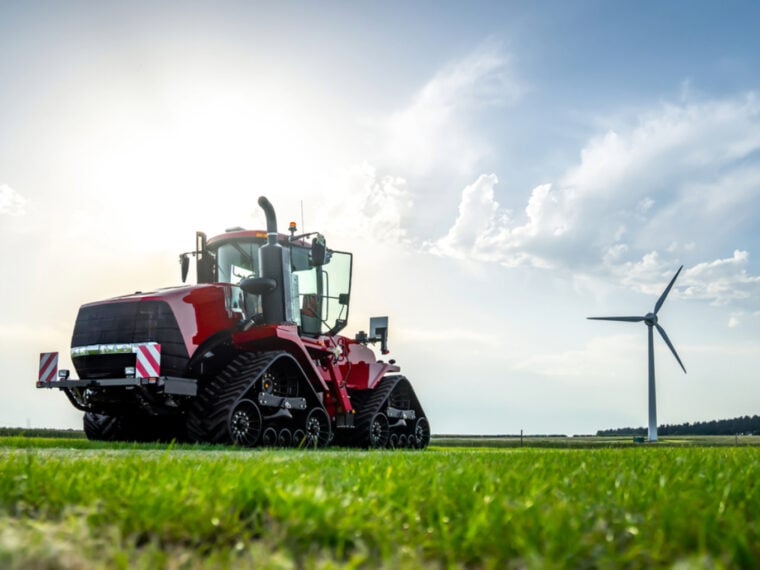
SUMMARY
The rising costs of diesel and its impact on the environment have led to a growing demand for sustainable alternatives
The biomass industry encompasses generation of bio-fuels and biogas, production of organic fertilisers, biomass power plants and other valuable byproducts
Electric tractors are emerging as a game-changer in the agricultural sector, particularly in the context of the biomass industry
India, a country with a rich agricultural heritage, is witnessing a significant shift towards sustainable and eco-friendly practices in recent years. One of the key players in this green revolution is the biomass industry, which utilises organic materials to generate energy.
Biomass, comprising organic materials such as crop residues, wood, and animal waste, is an abundant and renewable source of energy. With increasing environmental concerns and a growing demand for sustainable energy sources, the biomass industry is poised to play a pivotal role in India’s energy landscape.
This sector is experiencing unprecedented growth, and its potential is far from fully realised. In this context, the integration of electric tractors is poised to play a pivotal role in propelling the biomass industry forward.
This article delves into how electric tractors can catalyze the growth of the biomass industry in India.
The Booming Biomass Industry
India is an agricultural powerhouse, with a vast expanse of arable land and a predominantly agrarian economy. The agricultural sector generates a substantial amount of crop residues and organic waste.
Historically, these residues were often burned in the open, leading to air pollution and the release of greenhouse gases. However, as environmental awareness grows, there has been a shift towards utilising biomass for energy generation.
The biomass industry in India has witnessed remarkable growth over the past decade. It encompasses a wide range of activities, from the generation of bio-fuels and biogas to the production of organic fertilisers, biomass power plants and other valuable byproducts.
This industry is not only creating new economic opportunities in rural areas but also contributing significantly to the country’s efforts in achieving renewable energy targets and reducing its carbon footprint. However, to fully harness the potential of biomass, mechanisation is crucial and this is where electric tractors come into play.
Challenges Faced By Traditional Tractors
While the biomass industry holds immense promise, it is not without its challenges.
Conventional diesel-powered tractors, which are the backbone of Indian agriculture, contribute significantly to air pollution and greenhouse gas emissions.
Moreover, the rising costs of diesel and its impact on the environment have led to a growing demand for sustainable alternatives.
The Electric Tractor Revolution
Electric tractors are emerging as a game-changer in the agricultural sector, particularly in the context of the biomass industry.
These vehicles are powered by electricity, making them a cleaner and more sustainable alternative to diesel-powered tractors.
By eliminating tailpipe emissions, electric tractors significantly reduce air pollution and contribute to a healthier environment for both farmers and the surrounding communities.
Here are some key advantages of electric tractors in the biomass industry
- Zero Emissions: Electric tractors produce zero tailpipe emissions, which is crucial for maintaining air quality in agricultural areas. This is particularly important in biomass farming, where organic materials are grown for energy production.
- Cost-Effectiveness: Electric tractors have lower operating costs compared to their diesel counterparts. The cost of electricity is generally more stable than diesel prices, which can fluctuate significantly. Additionally, electric tractors have fewer maintenance requirements, leading to long-term cost savings for farmers.
- Reduced Noise Pollution: Electric tractors are considerably quieter than diesel-powered ones, reducing noise pollution in agricultural areas. This not only benefits farmers’ health but also improves the overall quality of life for communities near farming operations.
- Enhanced Efficiency: Electric tractors offer instant torque and smooth acceleration, making them well-suited for the demands of agricultural work. They can efficiently power implements used for biomass collection, shredding and transportation. This can result in higher productivity and cost savings for farmers.
- Sustainable Energy Integration: Biomass residues can be converted into biogas or biofuels for electricity generation or use in electric tractors. This closed-loop system maximises resource utilisation and minimizes waste. The synergy between the biomass and electric tractor industries promotes a circular economy and reduces dependence on fossil fuels.
- Energy Independence: The adoption of electric tractors can drive rural electrification, especially in regions with unreliable or limited access to grid power. Farmers can use their tractors to generate electricity for their homes and communities, fostering economic development in rural areas. By utilizing electricity, which can be generated from renewable sources, electric tractors contribute to reducing dependence on fossil fuels and promote energy self-sufficiency.
- Government Incentives: Many governments, including India, are offering incentives and subsidies for the adoption of electric vehicles, including tractors. These incentives can significantly offset the initial investment required for transitioning to electric farming equipment.
Challenges And Considerations
While electric tractors hold great promise, their widespread adoption in the biomass industry does face some challenges:
- Initial Investment: Electric tractors are generally more expensive upfront than conventional tractors. However, government subsidies and incentives can help mitigate this cost barrier. Banks and NBFCs will play a crucial role in overcoming the challenge of higher upfront cost and allow funds access to a new tractor owner to access a more productive machine.
- Infrastructure: Rural areas may lack the necessary charging infrastructure for electric tractors. Developing a network of charging stations in agricultural regions is essential for their widespread adoption. Simplifying the charging of an electric tractor with an on board charger can be a great way to get around the charging infrastructure challenge.
- Battery Technology: Continued advancements in battery technology are needed to improve the range and durability of electric tractors, especially in heavy-duty applications like biomass processing.
In Conclusion
The biomass industry in India is at the cusp of a transformative revolution, driven by the integration of electric tractors. These vehicles not only align with the industry’s sustainability goals but also address critical environmental concerns associated with traditional farming practices.
The industry is rapidly expanding, presenting a unique opportunity to address environmental concerns, create employment, and bolster rural economies. As technology continues to evolve and infrastructure improves, electric tractors are poised to become an integral part of the country’s agricultural landscape, leading the way toward a greener and more prosperous future.
Electric tractors are poised to play a pivotal role in this revolution by offering a cleaner, more efficient, and sustainable means of biomass collection and processing.
Government support, industry collaboration, and technological innovation are crucial to overcoming the challenges associated with the adoption of electric tractors in the biomass sector. By harnessing the power of electricity, India can not only revolutionize its biomass industry but also pave the way for a greener, more sustainable agricultural future.
The synergy between the two sectors can lead to cleaner energy, reduced pollution, and improved rural livelihoods, making it a win-win for both farmers and the environment.






























 Ad-lite browsing experience
Ad-lite browsing experience